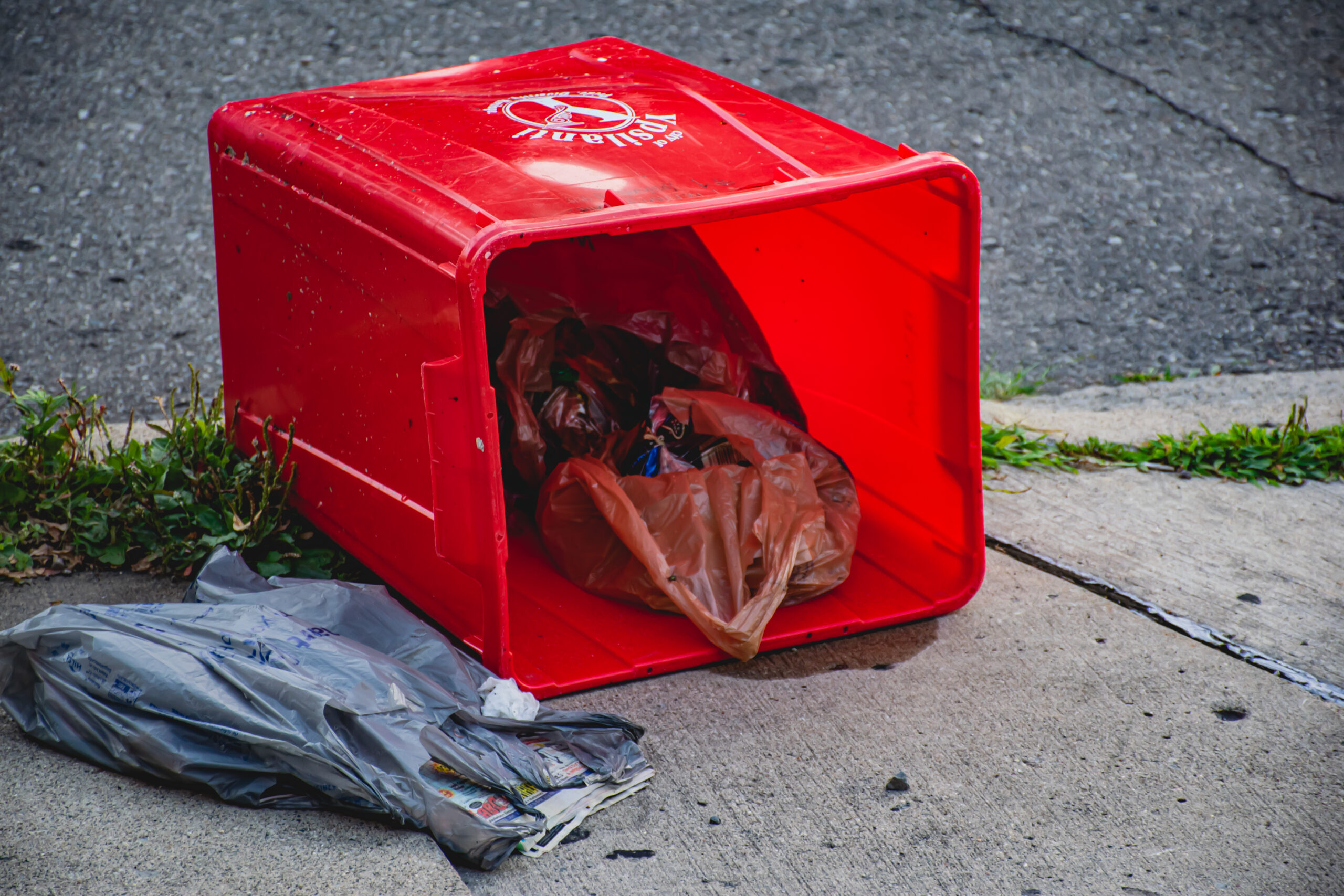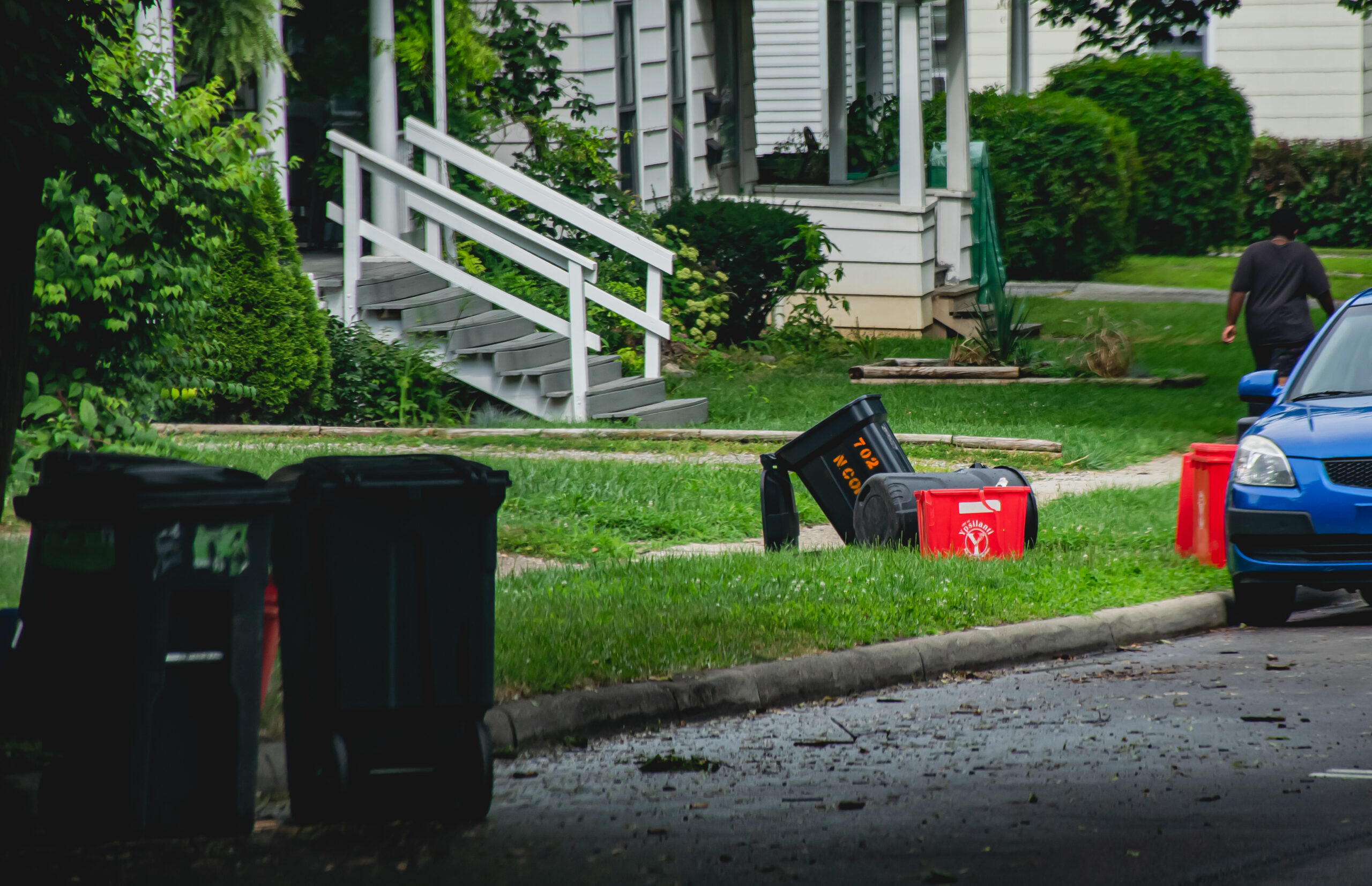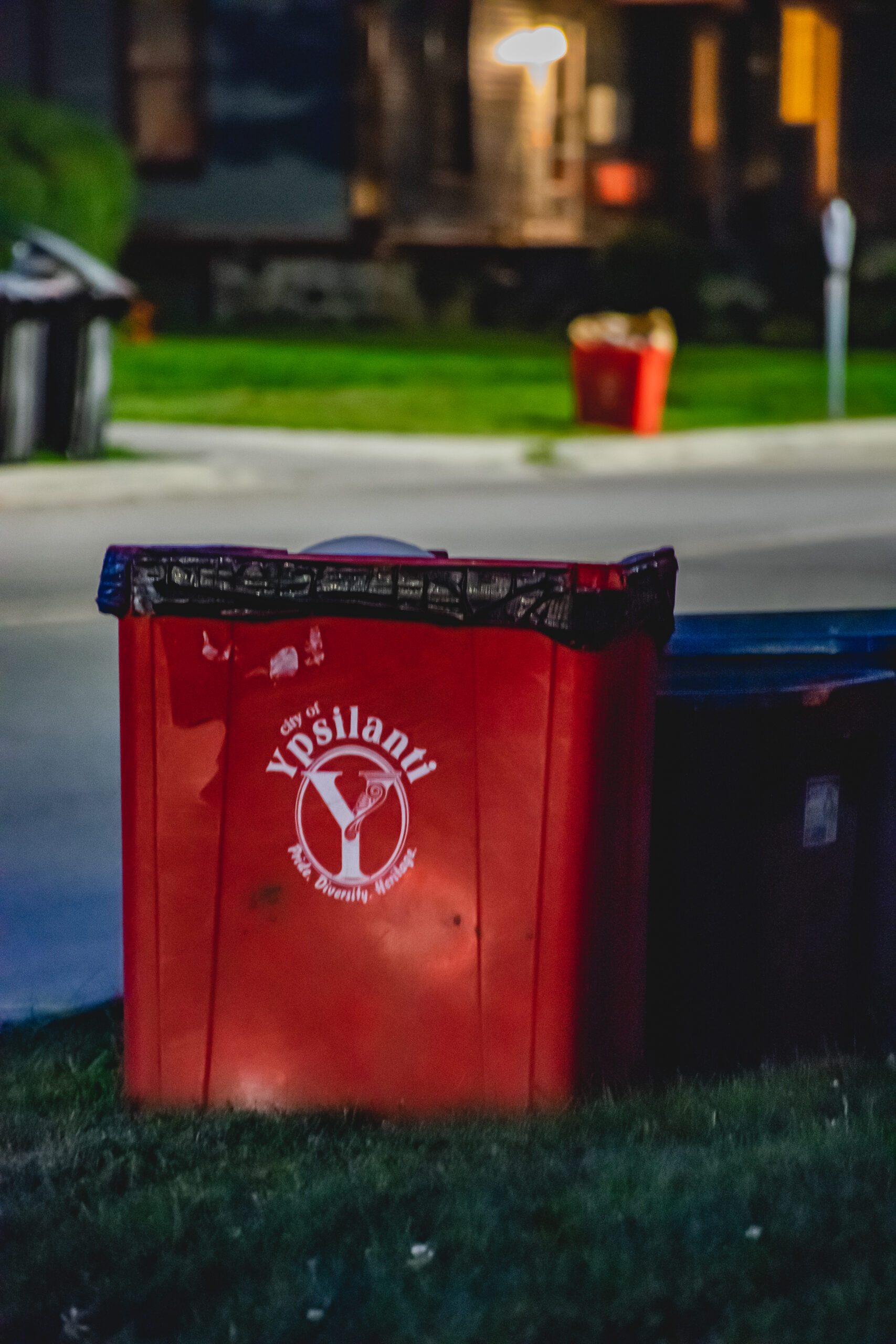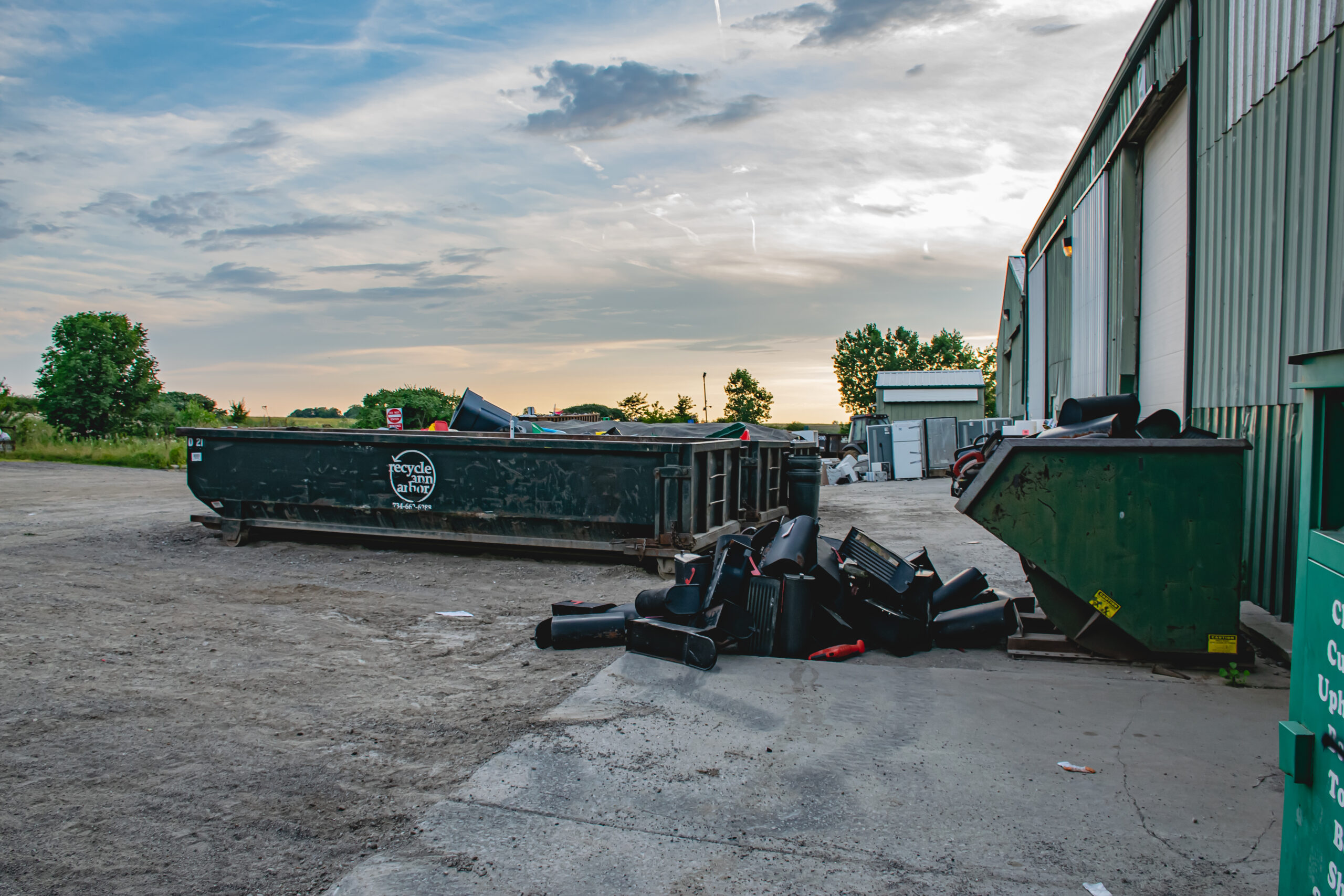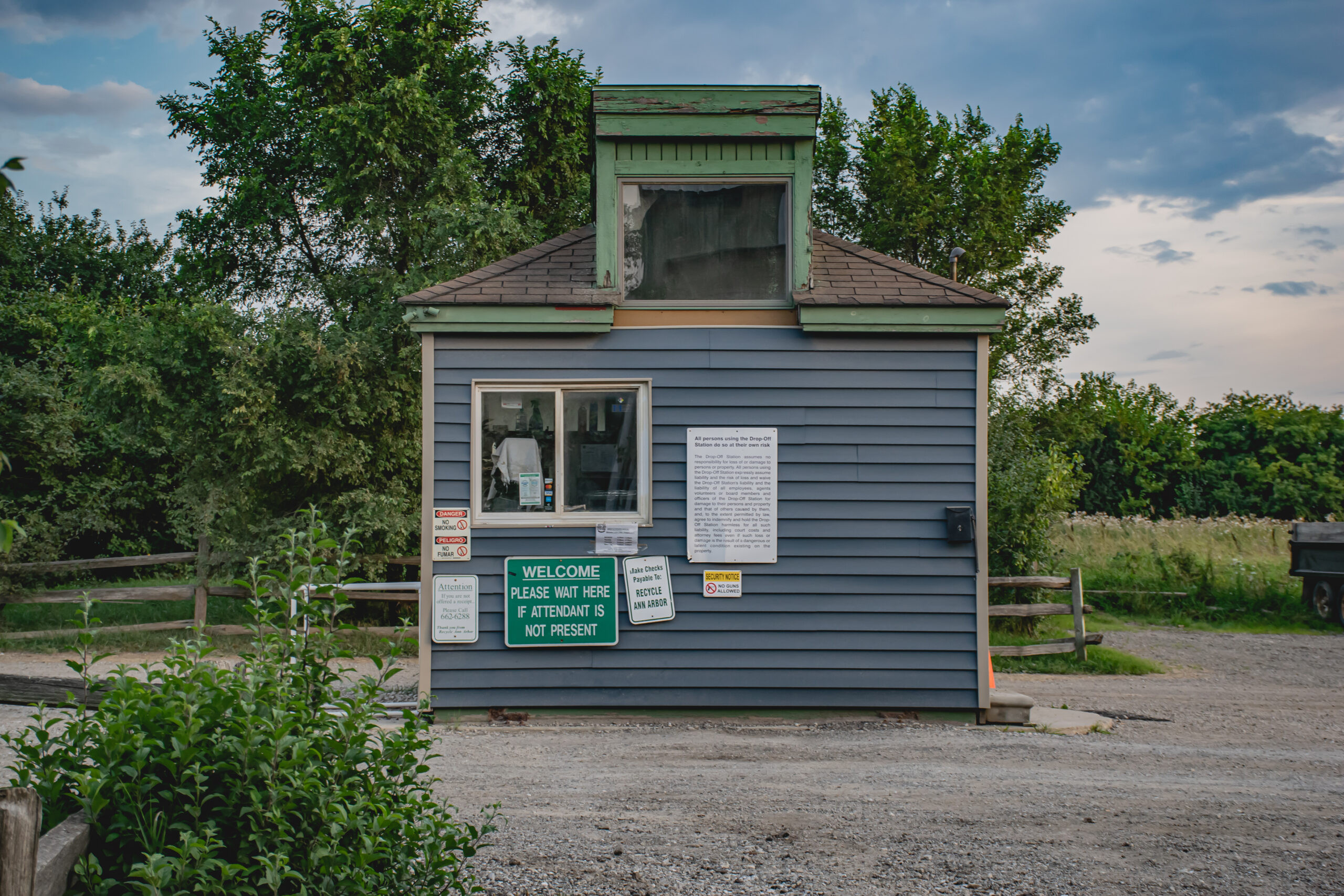As the world of recycling changes, residents express skepticism and optimism. [Format: Subheading]
On Aug. 9, the Ypsilanti Department of Public Services director Ron Aker announced in the mayoral bulletin that the city’s curbside single-stream recycle pickup program will no longer accept glass, milk cartons or juice boxes.
In a press release, the Western Washtenaw Recycling Facility (WWRA) in Chelsea, where materials are sorted and recycled, said the decision was due to no guarantee that containers placed in curbside bins will be properly recycled due to a high rate of broken glass received in single-stream.
“I reuse lots and lots of glass, but that’s just really upsetting to me,” said Lisa Bashert, an active community member with a heart for the environment.
Now glass joins items destined for either a drop-off facility or the trash.
Bashert used to take her recycling to a drop-off center that used to operate near Frog Island Park, which closed in 2018 due to environmental risks associated with its close proximity to the Huron River. Whenever the park applied for grants for upgrades, Bashert said. it was denied due to various violations the collection facility posed.
While shuttering the facility might have been in best interest of the environment and future of the park, Ypsilanti residents must drop off recycles at at facility in Ann Arbor. While Bashert drives that way often, she recognizes that’s not the case for all Ypsi residents.
Trevor Bowden and Ariel Ojibway are neighbors in Ypsi’s Normal Park community, sharing a multi-unit house and single-stream recycling bin with housemates.
“I’m going to recycle anyway, but it’s too bad other items aren’t get recycled if they’re contaminated by leftover food,” Ojibway said, “Because sometimes items thrown in our bin aren’t clean.”
According to FiveThirtyEight report, people are including more items in curbside recycling where single-sort systems are offered, citing multiple studies over the years indicating as much, with a growth in this system coinciding with a growth in recycling nationwide. Yet according to a slew of studies in the same report, increases of materials coming through single-stream also means a higher volume of unwashed items turning up, making processing costlier and less marketable.
“And I’m not going to say ‘No, get that out of there,’” Ojibway said. “So sometimes we have where an item is put in the bin, then taken back out by someone else to clean.”
“Or people will just throw it away because they don’t know where it goes,” Bowden said.
Bowden was recently looking into nearby businesses that offer to accept items not regularly accepted in recycling pickup services, such as cloth to lightbulbs and batteries.
“People don’t seem to know, but I actually found places accepting the things that can’t go into curbside,” Bowden said. “But you do have to actually go drive to them, which is another step.”
A list of locations that accept household batteries can be found at the Ypsilanti Township recycling guide.
Since 2015, the City of Ypsilanti offers free single-stream curbside recycling to city residents living in a four unit or smaller apartment building or home, and can acquire a bin for free by calling (734) 483-1421 or visiting the Department of Public Services office. Residents are also eligible for discounted passes for a drop-off center.
For township residents, recycling stickers can be acquired and put on a 32-gallon container with handles. Stickers can be acquired for no cost in the lobby of the Tilden R. Stumbo Civic Center or by mail by contacting Residential Services at (734) 484-0073. Recycle bins (18-gallon) and lids are also available for purchase from the center for $10 and lids for $5, according to the Township website: ytown.org (also see Compost Site where other items can be dropped off to be properly disposed of).
Residents with a Township address have free yard waste and two free yards of compost space, with $8 per yard after that. Items eligible for composting include grass, brush and branches. It’s free for all to recycling things such as scrap metal and old car batteries. The center also accepts for recycling old freezers, carpet, air conditioners and many other items typically thrown into a landfill dumpster if not accepted in a typical pickup or drop-off bin.
Those who need to drop-off materials not collected in the city’s single-stream curbside program are eligible to purchase discounted passes to the Recycle Ann Arbor Drop-Off Station that also include a limited number of free drop offs per year for big items like old appliances or reuse.
Located at 2950 E. Ellsworth Road, Ann Arbor, Recycle Ann Arbor worked with the City of Ypsilanti to set up a voucher program for City of Ypsilanti residents to access the Drop-Off Station for recycling a wide range of materials. Information about the program is available on the City of Ypsilanti’s website.
Normal Park resident Randi Mayrent echoed concerns about the fate of the material she recycles.
“Nowadays the whole concern is what happens when it leaves here,” she said. “So I recycle everything at home, and I’m the ‘Recycling Queen’ at work — everyone sort of just knows to leave things out for me to take home to put in with my own recycling.”
Mayrent said between curbside pickups she’s typically able to amass a small mountain of corrugated cardboard, the size of which she said her neighbors certainly notice. They stay in touch through their neighborhood’s Facebook group, where members offer to take items to the Ellsworth drop-off center with their own haul.
“Oftentimes that person is me,” she said. “I don’t understand how anyone wouldn’t know plastic can be recycled, or even cardboard boxes. With the amount of shipping done online, everyone should be recycling these things.”
It’d be nice if city residents were eligible for the 96-gallon toter carts available to Ypsi township residents eligible for the bi-weekly township pickup service, Mayrent said, with their easy ”roll-to-curb” wheels meant to replace the regular recycling bins, which in the township are picked up by Waste Management Inc.
While Mayrent hasn’t noticed much change in services over the years, she believes it’s confusing for residents that the small plastic bins the city originally gave out in the past when services were under different management are no longer accepted on their own — they must be accompanied with at least one of the current bins.
“Everyone was calling to ask what was going on, and people were asking me because I was the only one who’s bins they were taking,” she said.
Mayrent volunteers with Meals on Wheels, and she sees how disposable food containers haven’t yet made the switch biodegradable materials.
“I try to adhere to reusing things as much as I can,” she said. “And I going around pick up the those unused newspaper bags you see otherwise left out in the elements forever. We can use those for picking up after our dogs or other things, using them least for something.”
“It’s not that people don’t care, it’s just that people’s lives are busy,” Mayrent said. “If it’s truly being recycled, I wonder why so many apartment and housing complexes don’t offer any recycling services for their tenants.”
Ypsi resident Ian Green rents a room in a house that’s signed up for the city’s single-stream curbside pickup.
“I try to recycle everything I can, including things that I probably shouldn’t,” said Green.
On the city’s website, it states certain items, like plastic lids, actually go in the trash instead of the bin.
“I’m not really sure what plastics you can and can’t recycle, so I just put them in the bin and feel totally absolved of any responsibility,” he said.
Green is concerned by reading reports stating how most of what is recycled just ends up in landfills in other places.
Indeed, an average of around 25 percent of items recycled are contaminated and end up in landfills anyways, according to the National Waste and Recycling Association.
“That seems to be confirmed by the fact that very little of what I consume seems to be made out of recycled materials,” Green said.
Those Michigan landfills aren’t getting smaller, being filled with garbage from outside of the state, including Canada, according to a Detroit Free Press report. According to the World Bank, the amount of trash accumulating in general is forecasted to grow by 70 percent in 30 years.
“Where does it all go? What do they do with it? I have no idea. I’m a bin chucker, not a thinker.”
Ypsilanti Township resident Matt Pancone said he recycles everything that he’s able to recycle: from paper to plastic and glass.
Pancone drops off his recycling once every three weeks or so, usually placing them in one of the single stream bins his neighborhood provides, but hangs on to items like lithium batteries until he has a small pile to drop off, as he said it’s otherwise hard justifying trips out to Ann Arbor Recycle.
“Lately I’ve heard a lot about recycling not getting recycled and piling up,” Pancone said. “Regardless, I stick to it.”
Pancone wonders how much of his materials are really getting recycled, he said.
“The changes to laws in China have affected recycling that we send there, and I feel like we need more facilities in this country and rely less on other countries.”
How global shifts have impacted local communities:
While China stopped accepting recycled materials from the rest of the world on in 2018, Malaysia followed suit in 2019 by ceasing to accept plastic recyclables from other counties. The burden was put on major importer countries like the U.S. to begin processing their own recyclables.
In the U.S., demand has skyrocketed for cities and municipalities to begin processing materials. Many U.S. recycling programs began sending materials to landfills or altogether folding due to rising costs of collection, according to New York Times reports.
In Michigan, many municipalities will connect with a waste management service to process recyclables at their own processing facilities. Yet processing is becoming costlier with the increased demand, and according to reports by the Lansing State Journal and Michigan Radio, municipalities are facing shut downs amidst these dramatic global changes.
Community leaders focus on the big picture
Ypsilanti resident Noah Rucker said curbside recycling is something people have to stay on top of, using the metaphor of “closed mouths don’t get fed” to describe how the recycling services might not be utilized by people if people are not being often reminded about the programs.
“I think about a lot of people who are scared to speak up for themselves,” Rucker said. “There are quality neighborhoods out here in Ypsilanti, but there’s also poverty and neglect as well.”
Rucker was recently welcomed to join the Washtenaw County Health Department’s Steering Committee, which aims to prioritize public health issues and take action to improve conditions for local communities.
Rucker helped establish the Parkridge Community Center garden, where everything within the garden space is being put to use or recycled, and keeping a sustainable relationship.
“[Parkridge] put a lot of energy into cleaning up the neighborhood, so people are more aware to help prevent littering, and they have more pride about the areas they live now,” Rucker said.
This center helps spread the message in the community, Rucker said, who said he sees more people picking up litter around town.
Rucker said he believes it’s becoming more common for people to pay attention to the permanence of waste, with businesses starting to meet a rising demand for sustainability (like seeing more biodegradable drinking straws and takeout containers).
At the center, Rucker works with Bashert, who said her goal was to practice a permaculture system that the public could become involved in and learn about how to adopt a sustainable lifestyle.
As a means to reconcile the amount of non-biodegradable waste ending up in the environment, residents like Bashert and Rucker are adopting mindful waste reduction habits to reduce the amount of materials they contribute to the cycle.
For Bashert, pollution affects her both emotionally and spiritually.
“It’s become deeply important to me,” she said. “When I go out kayaking, and you’re in the boat, and there’s tire in the bottom of the river along with other trash, I feel like it’s such an insult to other animals trying to live in the environment.”
Bashert’s eyes were opened to how pervasive single-use, non-biodegradable waste is while challenging herself to purchase and bring into her house as little single-use material as possible.
“I always found that extremely challenging to even conceive of,” Bashert said.
Yet she’s surprised how much waste she’s been able to reduce by making a few changes in the sort of products she purchases and their subsequent disposal methods have significantly reduced how much waste Bashert and her spouse output.
Now, she and her spouse only fill one kitchen-sized garbage bag each month and fills one curbside recycling container per week, giving them a 1-4 ratio of trash to recycling.
Bashert referenced the recycling code of “Reduce, Reuse, Recycle,” saying people might not understand how serious the hierarchy is.
“Our focus should really lie in using less to begin with,” she said.
People practicing zero-waste principles ideally save money while also reducing their footprint.
It’s possible to save on grocery and energy expenses by utilizing more of what they have while reducing the number of products thought to have been essential, Bashert said.
While Bashert has been an environmental advocate for years, she was inspired to reduce the amount of trash she personally throws out through studying permaculture, or prioritizing efficiency and waste reduction.
Permaculture has grown to mean many things, but is originally based on three main tenets: to care for people, to care for the Earth and to share its finite resources fairly between us. By adopting the resilient and efficient features observed in natural habitats, permaculture practices can and have been improving sustainability in all human systems.
Bashert’s adjustments to her lifestyle have significantly reduced the amount of non-biodegradable items such as plastic or polystyrene foam that she’s purchasing and disposing of in into the waste stream.
When restaurants don’t offer eco-friendly takeout containers, Bashert now keeps handy a few sheets of foil neatly folded in her purse for such occasions.
Aluminum alloys like tin and foil are better suited for recycling than plastic or foam, because the chain of polymers which make up plastic degrade each time they’re recycled into new products, limiting them to three to four times before becoming unusable.
While companies are filling in specific recycling gaps for products that are not often accepted in most recycling steams, like toothbrushes, it’s difficult and costly.
Products which involve the step of tossing plastic in the trash may be obvious in some products, yet in other products, it may be less obvious for consumers to consider.
Bashert often shops at the Ypsilanti Food Co-Op, where she’s successfully requested plastic-free and sustainably packaged products. Thanks to Bashert, the Ypsi’s Co-Op carries essential items which might fall under the radar are available this way, from lip balm in paper push-up containers to dental floss made of silk (instead of nylon) spooled inside a small glass vial.
The impact of changes like this may be hard to measure, but it’s a lifestyle decision that may be the only sensible way to live.
